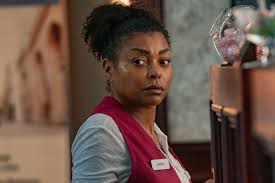Tyler Perry’s 2025 Netflix film Straw is more than just a drama—it’s a searing indictment of systemic racism and the crushing weight of injustice faced by Black Americans, particularly Black women. Directed, written, and produced by Perry, the film follows Janiyah Wiltkinson (Taraji P. Henson), a single mother in Atlanta whose life spirals into desperation as she battles poverty, discrimination, and a system designed to keep her down.
Unlike Perry’s more familiar melodramas, Straw is raw, unflinching, and politically charged, forcing viewers to confront the harsh realities of institutional neglect. Straw has taken audiences by storm, delivering a heart-wrenching story that has left viewers reaching for tissues. The film has left audiences emotionally shattered, with many calling it Perry’s most powerful and urgent work to date.

At its core, Straw is a story about resilience in the face of relentless oppression. Janiyah, a hardworking nurse, finds herself trapped in a cycle of evictions, wage theft, and bureaucratic indifference, each setback pushing her closer to the edge. Perry meticulously portrays how systemic barriers—from healthcare disparities to predatory lending—chip away at her dignity and hope. Henson delivers a career-defining performance, embodying both the quiet strength and simmering rage of a woman fighting for survival in a society that views her as disposable. Supporting actors like Sterling K. Brown as a disillusioned social worker and Danielle Deadwyler as Janiyah’s equally struggling best friend add layers of depth to this harrowing narrative.

The film’s title, Straw, serves as a potent metaphor—Janiyah is bent by hardship but refuses to break, even as the weight of injustice threatens to crush her. One of the most devastating scenes involves Janiyah’s confrontation with a hospital administrator (played by Phylicia Rashad), who coldly denies her medical assistance after a workplace injury, highlighting how Black women’s pain is routinely dismissed. Another gut-wrenching moment comes when Janiyah’s son is unfairly targeted by police, a scenario that underscores the generational trauma of racial profiling. These scenes are not just dramatic; they’re a mirror held up to America’s failures, demanding accountability.
What makes Straw so impactful is its refusal to offer easy solutions or sentimental redemption. Perry doesn’t soften the blow—the film’s climax is as brutal as it is inevitable, leaving viewers in stunned silence. Yet, amid the despair, there are glimpses of communal solidarity, showing how Black women often bear the burden of systemic oppression while still finding ways to support one another. The haunting score, sparse dialogue, and intimate cinematography immerse the audience in Janiyah’s world, making her struggles feel viscerally real.

Since its release, Straw has ignited urgent conversations about racial and economic justice, with many praising Perry for using his platform to amplify such an unapologetically political story. Critics have drawn comparisons to Precious, The Hate U Give, and Queen & Slim, but Straw stands apart as a uniquely Tyler Perry vision—blending his signature emotional depth with newfound urgency. This isn’t just a movie; it’s a call to action, a demand for society to see and value Black women’s lives. For those brave enough to watch, Straw will leave an indelible mark—and hopefully, a fire to fight for change.



